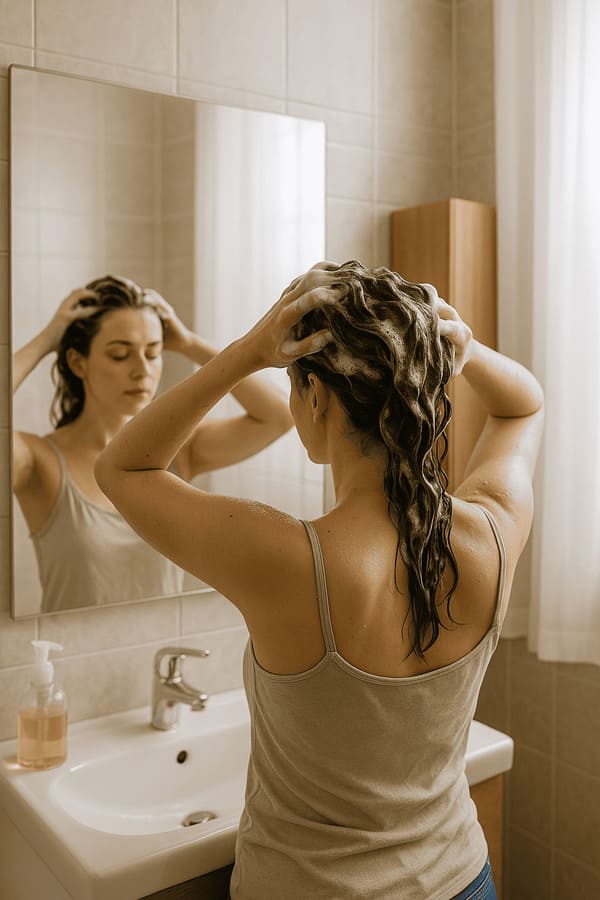Rosacea is an inflammatory skin disease that affects the facial skin of both men and women.
It manifests itself with significant redness, visible capillaries and even pustules and eye problems.
Index
Rosacea Characteristics and Symptoms
Rosacea appears most commonly on the cheeks, nose, chin, and forehead, but can also appear on the scalp, ears, and neck.
The face is red and the skin burns. Hot flashes appear, capillaries are visible under the skin due to dilation of the blood vessels. Red pustules appear and the skin thickens. The eyes become red and inflamed.
The National Rosacea Society of the United States of America has distinguished four types of facial rosacea based on the symptoms:
-
Erythematotelangiectatic rosacea : persistent facial redness, broken capillaries, dry, swollen skin.
-
Papulopustular rosacea : persistent skin redness with raised papules and purulent pustules
-
Phymatous rosacea : usually an advanced stage of the disease, the skin, especially on the nose and chin, appears red and hardened.
-
Ocular rosacea : the eye area is also affected by inflammation. The area around the eyes and the eyelids appear red and dry, with burning and swelling, sensitivity to light and accentuated tearing.
Who is more prone to rosacea?
Women are more affected, especially during menopause, but it is also widespread among men.
The disease is not contagious and the most affected subjects are:
- Adults between 30 and 60 years old
- Who blushes easily
- Those with light hair and skin
- Who has other cases of rosacea in the family due to heredity
Causes of Rosacea Dermatitis
We should preferably talk about triggers and not causes, the most common are:
- Inheritance
- Intense and daily physical exercise
- Sun exposure
- Very cold climates
- Frequent intake of alcoholic beverages
- Spicy and very spicy foods
- Periods of emotional stress
- Prolonged use of creams containing steroids
- Bacteria
Rosacea: dermatological treatment
For a medical-dermatological treatment of rosacea it is necessary to go to specialized centers, however a definitive cure does not exist but only local treatments of the symptoms.
Natural remedies for rosacea
The symptoms of acne rosacea can be alleviated and reduced with the use of natural remedies.
Aloe vera is an exceptional skin soothing remedy, it hydrates, calms and refreshes. It soothes the burning sensation and provides immediate relief.
Extracts of helichrysum, oats, lavender, ginkgo biloba and chamomile are excellent calming tonics.
Prevention and daily treatments for rosacea
Rosacea recurs cyclically, being a chronic disease, acute phases and phases of remission alternate.
To prevent inflammation, it is always a good idea to protect your skin, even in the city, with high-factor sunscreens and to cleanse and moisturize with delicate products.
Rosacea Skincare Routine Products We Recommend
Yuniwa Cleansing Mousse is a soft cloud that delicately cleanses the skin without attacking it, providing hydration and decongestant and soothing elements, such as blueberry, rice, calendula and hyaluronic acid.
Yuniwa Chamomile Hydrolate is excellent as a tonic in case of rosacea thanks to its soothing, calming, refreshing and hydrating action. You can also spray it on your face as needed during the day, when your skin requires a touch of freshness.
Skin stressed by rosacea will love the action of Yuniwa Probiotic Booster . A treatment based on probiotics, bisabolol, vitamin E, which helps rebalance the skin's barrier function and reset it in moments of greater stress.
Thanks to Fitocose Blueberry Cream, a specific emulsion for the treatment of sensitive, reactive and stressed skin, you will get a very valid help in restoring normal skin.
SOS redness and burning
YU Aloe Vera Gel is a soothing and hydrating treatment that repairs and regenerates the skin. Made with 99% cold-pressed Aloe Vera, it has a protective, soothing, emollient action, perfect for rosacea.
Want to learn more secrets on how to take care of your skin? Visit our skincare section to read all our tips on facial care.
If you don't know where to start, find out on our blog how to recognize your skin type !
[ApSC sc_key=sc3148331291][/ApSC]








